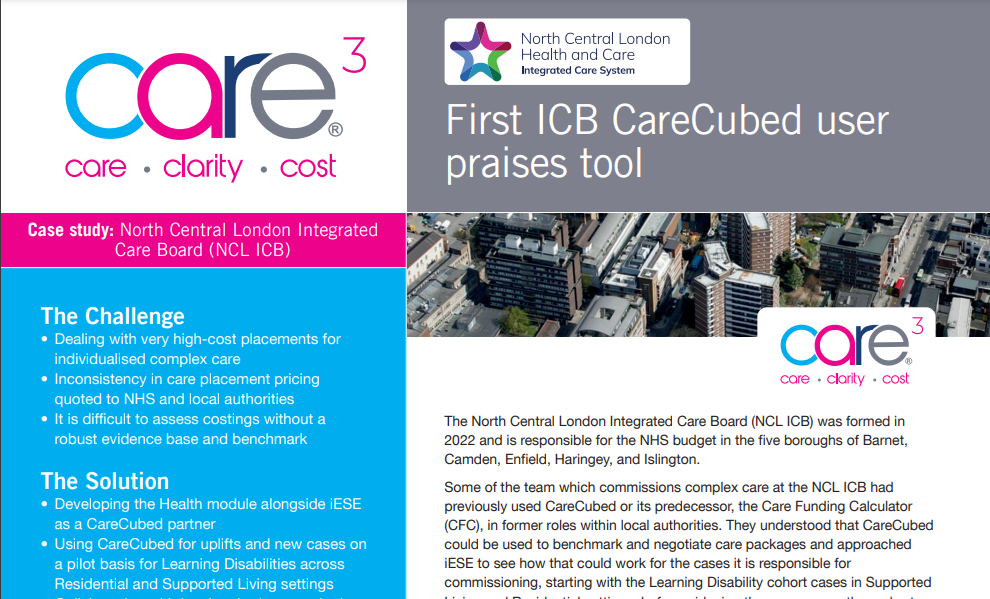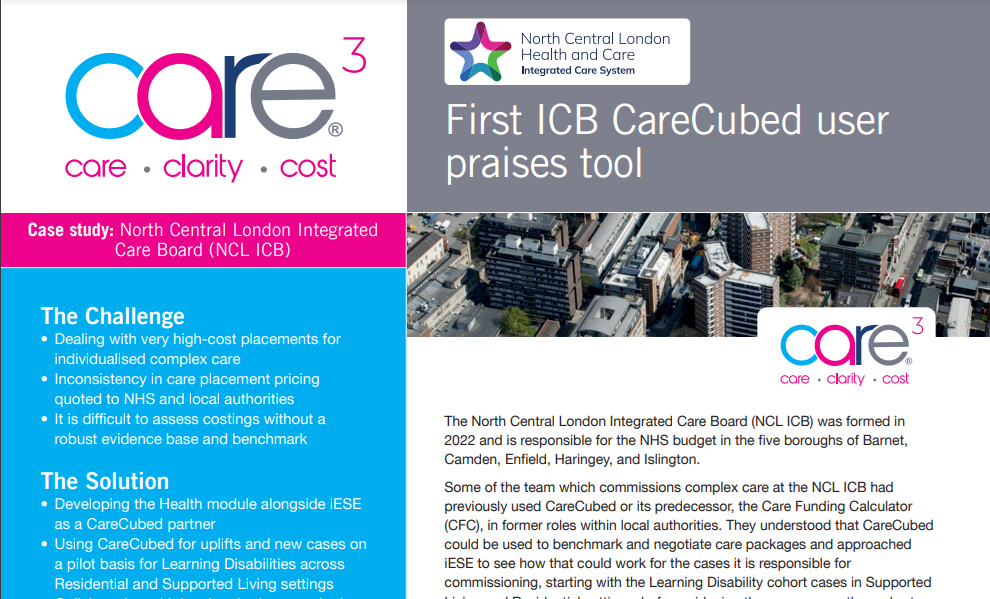
The Challenge
- Dealing with very high-cost placements for
individualised complex care - Inconsistency in care placement pricing
quoted to NHS and local authorities - It is difficult to assess costings without a
robust evidence base and benchmark
The Solution
- Developing the Health module alongside iESE as a CareCubed partner
- Using CareCubed for uplifts and new cases on a pilot basis for Learning Disabilities across Residential and Supported Living settings
- Collaborating with local authority users in the area to gather provider intelligence and have a consistent basis for reporting
Results
- A decision to extend the use of CareCubed across all Adult Continuing Healthcare and Children’s Continuing Healthcare
- Significant cost avoidance achieved instantly and consistently over a two-year pilot
- Collaborative working across the North Central London subregion between the ICB and local authority partners already using CareCubed
A much improved, streamlined process and mechanism to handle the growing number of uplift requests
The North Central London Integrated Care Board (NCL ICB) was formed in 2022 and is responsible for the NHS budget in the five boroughs of Barnet, Camden, Enfield, Haringey, and Islington.
Some of the team which commissions complex care at the NCL ICB had previously used CareCubed or its predecessor, the Care Funding Calculator (CFC), in former roles within local authorities. They understood that CareCubed could be used to benchmark and negotiate care packages and approached iESE to see how that could work for the cases it is responsible for commissioning, starting with the Learning Disability cohort cases in Supported Living and Residential settings, before widening the use across other cohorts.
“The team was formed almost three years ago and one of the goals we had was to make sure we commission with an understanding of our local market and the fair cost of care. CareCubed can meet those needs through what it offers so we reached out because we knew the tool might be suitable,” explains Christina Vona, Senior Commissioner Complex Care at NCL ICB.
While the ICB was able to make immediate use of the tool, iESE was keen to work together to enhance the solution to provide unique functionality based on the requirements for an ICB. The NCL ICB became a development partner of the Health functionality and this improved module is now available for all ICB’s to take on and realise similar benefits.
Initially, the ICB trialled CareCubed for two years to manage high cost packages and commission new learning disability residential and supported living care packages. It has since signed up for a further three years and now plans to extend the use of CareCubed across all complex care for Adult Continuing Healthcare and Children’s Continuing Healthcare.
ICB’s have a lower volume of cases compared with local authorities but these can be very high cost. During the early stages of the pilot, the NCL ICB was able to achieve a cost avoidance of £418,000 across only a handful of cases.
“We negotiated one case from £38 an hour to £22 an hour by using the tool to support an open conversation with the provider. There are fewer cases than for local authorities, but these can involve a lot of meetings and negotiating, a lot of analysing and breaking down the hourly rates and trying to understand what is being included. We have limited resource available, and an ever-increasing demand from providers that need to be supported in a sustainable way.
CareCubed helps as we then have an idea of what is reasonable to include and what isn’t. We can then use our limited time and budgets in the most effective way,” Christina adds.
Maria Makara, Commissioner at NCL ICB has been using the tool for residential placements, she says that CareCubed has added greater transparency to costings: “It was interesting to see how some costs were ‘hidden’ and became more obvious when we put them in CareCubed,” she says. Maria gives the examples of cleaning products, food, and staff training.
“Your eyes go to the higher numbers rather than the lower numbers and looking at those when you have a benchmark is more obvious, and we can ask the right questions and for evidence to support provider costings where required. Food costs might be higher than the benchmark due to specific dietary requirements and we now have a much better understanding and audit trail of these things, for example. Sometimes there are reasons for higher costs but knowing that a cost is high gives a good starting point to initiate those conversations,” she adds.
Most providers in the NCL area are already familiar with CareCubed, understand the importance of the tool and the benefits it provides to not just to commissioners, but also to their own organisation. For example, time-saving through a quicker, more transparent process. This is due to the common,
place-based approach adopted across North Central London which means there is less of a requirement for the ICB to explain what the tool is and a single costing methodology to understand. CareCubed is being used by around 500 care providers with many in NCL using the tool themselves to generate quotes for placements which makes it very easy for the councils in the region and the ICB to assess and understand whether they are getting value for money. When cases are passed onto the ICB because a client’s health needs overtake their other needs, the NCL ICB can be confident that existing packages have already been scrutinised.
The ICB has found the ongoing support from iESE and negotiation training provided by an iESE Associate beneficial, as well from the collaboration with the five local authority users of CareCubed in the North Central London subregion. “If you can use the tool but don’t know how to negotiate then there is a gap,” Maria explains, “Without the negotiation training it would have been more difficult to see results. We may be used to having conversations with providers, but not in this way. The training gave us the tools we need and CareCubed gives the context.”
“There is support from CareCubed but also from other colleagues that have been using it longer than us,” Maria adds, “CareCubed is widely used and the CareCubed Community links us up with other users. Some local authorities in our area have been using CareCubed for a very long time which means they can provide a bit of day-to-day support and intelligence on providers.”
In one instance, collaborating with local authority partners revealed a discrepancy in pricing. “There was a case where a provider was charging more than we had agreed. I reached out to local authority colleagues, and they shared what they were paying. This was useful for us to understand and helped us have those conversations with the provider about how costs relate to the care package, not about who is paying,” she adds.
Georgie Jones-Conaghan, Assistant Director of Complex Individualised Commissioning at NCL ICB, agrees that CareCubed has been useful: “We are a big proponent and advocate of the CareCubed tool. Cases like one we had recently where we negotiated down from £38 an hour to £22 make a difference. It is a really helpful tool, and we are looking forward to seeing how it will work and help us across more cohorts as we increase our usage. We have a responsibility to create a sustainable market whilst ensuring value for money from the public purse, and CareCubed is an important tool to support us with this.”










